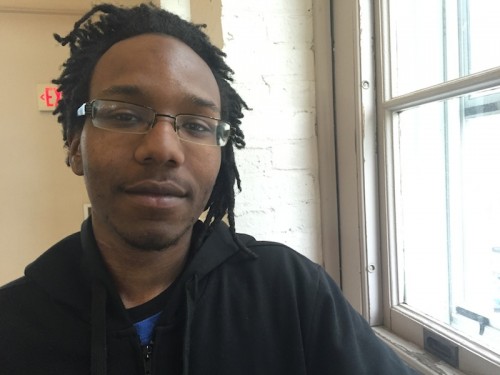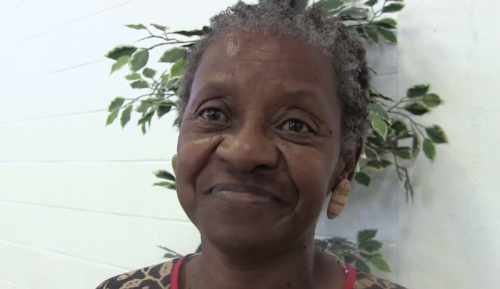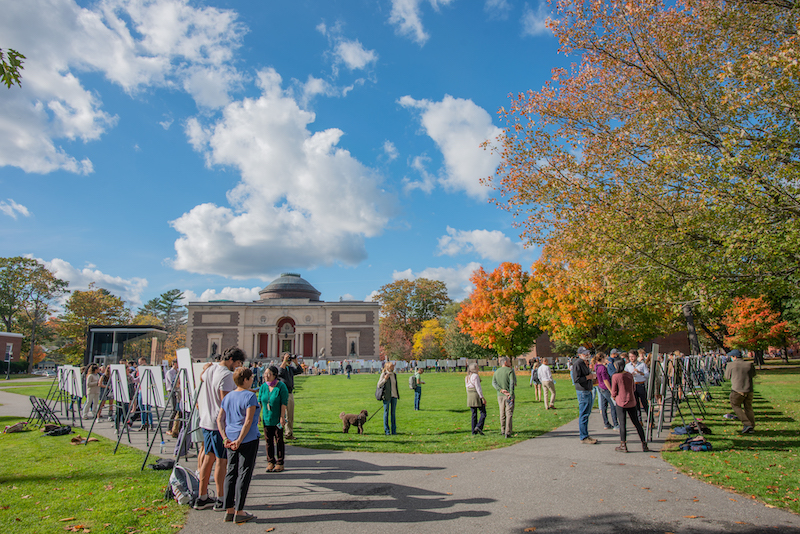KeVonté Anderson ’16 to Participate in 'NeXt Doc' for Emerging Filmmakers
 Before KeVonté Anderson traveled to Washington D.C. to attend the 20th anniversary of the Million Man March last fall, he came up with questions to pose to passing marchers. He borrowed a videocamera from Bowdoin to record his interviews and some of the scenes from the event.
Before KeVonté Anderson traveled to Washington D.C. to attend the 20th anniversary of the Million Man March last fall, he came up with questions to pose to passing marchers. He borrowed a videocamera from Bowdoin to record his interviews and some of the scenes from the event.
“I was seeking to answer that age-old question, who are we? By making the film, I wanted to dive into myself and explore the quintessential questions of my people,” Anderson said.
His questions included, who are you? Where have you been? What does ‘Justice or Else’ (the theme of the march) mean to you? How’d you end up here? Where were you 20 years ago? What has been happening in these last 20 years?
Anderson will have a screening of his documentary, ATLANTIÇ: The Middle Passage, on Tuesday, at 4 p.m., in Sills Hall Smith Auditorium. Based on this footage, Anderson has been accepted to NeXt Doc, a four-day intensive program in New York of workshops, master classes, and screenings that focuses on “emerging documentary filmmakers.”
Visiting Assistant Professor of Cinema Studies Sarah Childress has been advising Anderson with his independent study in cinema studies. She said NeXt Doc will be a chance for him to work with experienced mentors who can support his work and serve as important industry contacts.
Childress described Anderson as “a seeker and a seer” who uses film to evoke empathy with people who struggle and suffer. “He’s an intensely intuitive and creative individual with an incredible capacity to perceive, synthesize, and imagine,” she said. “He’s moved from a conventional documentary format to a montage approach that reflects his thinking and invites viewers to participate in a process of seeking. And feeling.”

Anderson interviewed many people at the Million Man March. But he was captivated by one so much he dedicated a short film about her. Poet Mama Laini Mataka gives Anderson her counsel and her observations about justice, relations between men and women, death, technology, and globalization. On the so-called generation gap between her and Anderson, she says it doesn’t exist. “What children call hip hop, that is their way of naming their aspect of our struggle,” she observed.
Anderson said he named his film after the lost city of Atlantis because he sees it as a symbol for the lostness of African Americans. “We’ve fallen into the sea,” he said. “We’ve forgotten who we are.” Since he was a young boy, growing up in Nashville, Tenn., Anderson said he’s been interested in Greek and Egyptian mythology, ancient civilizations, and African languages.
Anderson also composes music in the genre of Afro-futurism, which he describes as a “forward-thinking retrospective perspective.” In other words, “it’s about being in the present moment, thinking about the future while examining the past…It’s about engaging with the past and using technology to help shape the future,” whether that’s music, medicine, or film, he explained.
Kloud9, by KeVonté Anderson
After he graduates, Anderson will be a summer fellow with the organization, Sahal Global, in Ghana, where he studied abroad his junior year. He’s currently fundraising to buy video equipment, living costs, and to contribute to his project. In a northern Ghanaian village, Anderson will be partnering with local women to construct a solar-panel charging station for electronics.
Related Stories
-

-

-
 October 25, 2021The first Family Weekend in two years was held during a beautiful October weekend, with bright trees providing a backdrop to the President's Research Symposium, football and rugby games, food trucks, and student performances.
October 25, 2021The first Family Weekend in two years was held during a beautiful October weekend, with bright trees providing a backdrop to the President's Research Symposium, football and rugby games, food trucks, and student performances. -
